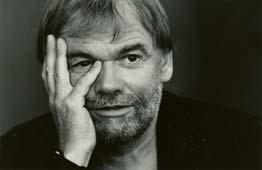
Jostein Gaarder
- Norway
- Zu Gast beim ilb: 2006
»Show wonder, question, don’t become complacent!« comments Jostein Gaarder. A credo with which he inspires his readers towards reflection and reminds them that the unsolved mysteries of the universe are more exciting than the questions already answered. The Norwegian author was born in 1952 in Oslo and studied Philosophy, Theology and Literature in his home city. He taught philosophy to children and adults for ten years and it was at this time that he began writing. Following its publication in Norway in 1991 Jostein Gaarder achieved international fame with his first novel »Sofies Verden« (Eng. »Sophie’s World. A Novel about the History of Philosophy«, 1994). Upon receiving a mysterious letter with the question »Who are you?« his 15 year old heroine begins a breathtaking journey through the history of philosophy, from Socrates to Sartre. Gaarder brilliantly tackles Sophie’s questions through the development of philosophical discourses and condenses the occidental truth-seeker’s complicated musings to their most central aspects. He comments on his worldwide bestseller that philosophy originated in the marketplaces of the Greek cities. »I wanted to bring it back to the marketplace.« »Sophie’s World« was the first book for young people to be placed in the German bestseller lists and has been translated into more than 50 languages, it has sold more than 25 million copies and in 1994 it was awarded the German Youth Literature Prize.
As the »Representative of Philosophy« (»Die Zeit«) Jostein Gaarder raises questions concerning the grand-scale enigmas of human existence, the mystery of creation and the power of imagination. In his works, aimed at children, adolescents and adults at one and the same time, he directs attention towards the questions raised by metaphysics, ethics and religion. In doing so he concentrates not on imparting notions and theses in any abstract way but rather on the development of thought itself. With ease, warmth and a great affection towards fables Gaarder considers the questions that also preoccupy children: How did the world come into being? Does God exist? Who are we? Where are we going to? Have spiders mouths? What does love mean? Through the use of humorous and sceptical dialogue Gaarder succeeds in taking his readers to the borders of knowledge and allowing them to philosophise independently. Through fashioning fantasy into an element with the power to incite action he sets up a new perspective on reality, allowing it once again to become a thing of wonder.
Jostein Gaarder’s novel for young people »Kabalmysteriet« (1990; Eng. »The Solitaire Mystery«, 1996) tells the story of a journey in three stages; one actual journey to Greece, an imaginary journey to a magical island and an intellectual journey into philosophy. Gaarder delves into the history of literature’s common topoi of adventure, towards shipwrecked seadwellers and south sea islands, to a living game of cards where the joker is a non-conformist intellectual and to wondrous gatherings of families. The reality of existence for the twelve year old Hans-Thomas regulary emerges in his fantastic actions, while he and his philosopher father engage on a daring search for his mother. In 1991 the author was awarded the Norwegian Literature Critics’ Prize for this »thoroughly exceptional book« (»Die Welt«). Quoting the first letter of the Corinthians in its title, »I et speil I en gåte« (1993, Eng. »Through a Glass, Darkly«, 1998) turns to the issue of God and develops his theology through the medium of the diary of a dying girl. In conversation with the angel Ariel the gravely ill Cecilia is challenged to consider her existence in the world and to use the power of her imagination to drill past what is shown as an accepted façade in the mirror. With the publication of »Appelsinpiken« in 2003 (Eng. »The Orange Girl«, 2004) Gaarder once again questions the inconceivable. The fifteen year old amateur astrologist Georg receives a letter from his deceased father, whose dramatic life story is interpreted by the son as a universal parable for life’s impermanence; this is a novel about personal happiness and the meaning of existence and death.
Gaarder’s most recently published work is »Sjakk matt. Gåter, eventyr og fortelliger« (t: Checkmate: Riddles, fairytales and stories), a renewed invitation to a journey to the borders of knowledge and an instructive incitement towards thinking. In August 2006, an essay published by Gaarder in the Norwegian newspaper »Aftenposten« caused a major stir with its searing criticism of Israel. In his commentary, he attacks, among other things, Israel’s military intervention in Lebanon. The prize-winning author lives with his wife and two sons in Oslo.
© internationales literaturfestival berlin
Durch einen Spiegel, in einem dunklen Wort
dtv
München, 2000
[Ü: Gabriele Haefs]
Das Kartengeheimnis
dtv
München, 2001
[Ü: Gabriele Haefs]
Der Geschichtenverkäufer
dtv
München, 2004
[Ü: Gabriele Haefs]
Das Orangenmädchen
dtv
München, 2005
[Ü: Gabriele Haefs]
Das Schloss der Frösche
Hanser
München, 2005
[Ü: Gabriele Haefs]
[Ill: Henrike Wilson]
Sofies Welt. Roman über die Geschichte der Philosophie
dtv
München, 2005
[Ü: Gabriele Haefs]
Schachmatt – das große Jostein Gaarder Lesebuch
Hanser
München, 2006
[Ü: Gabriele Haefs]
